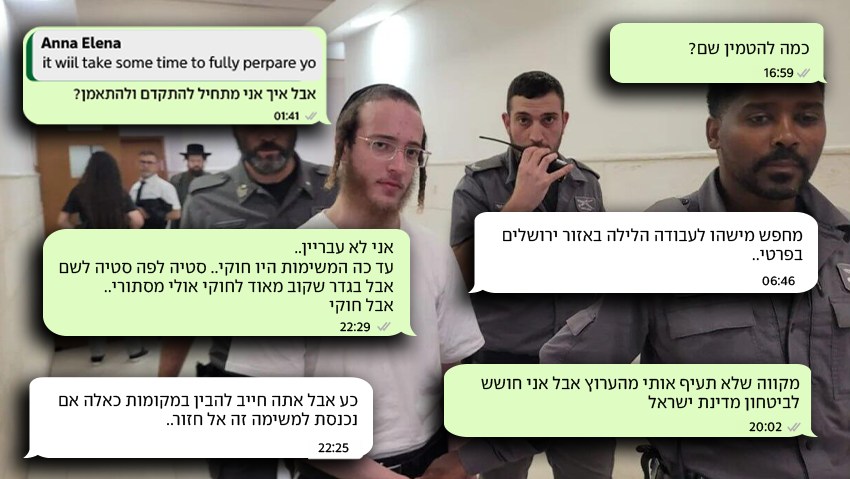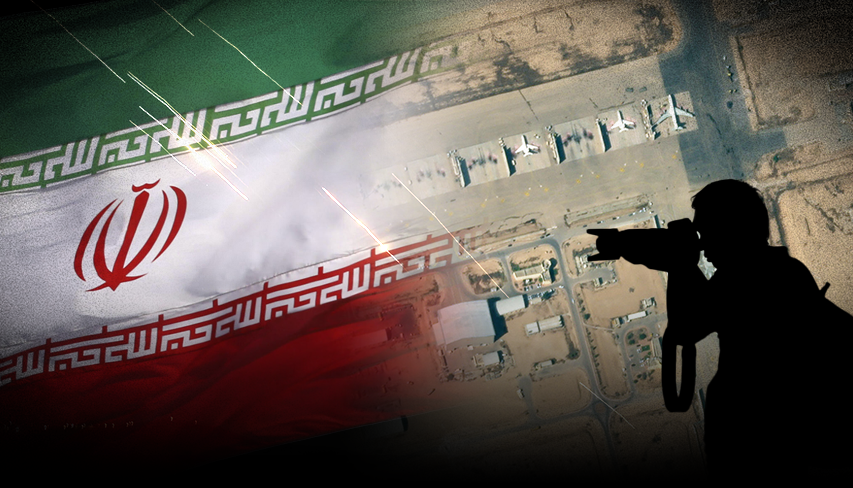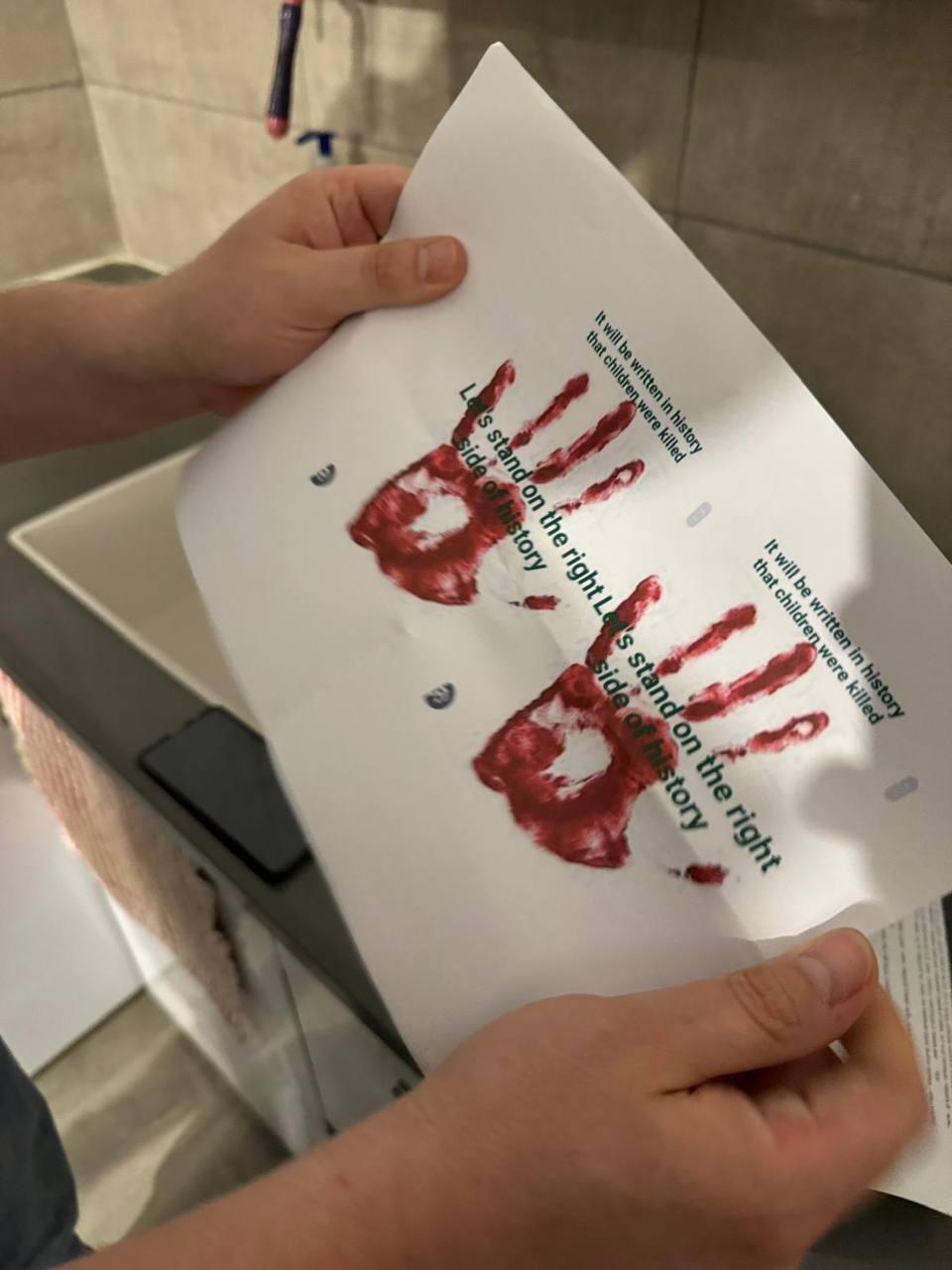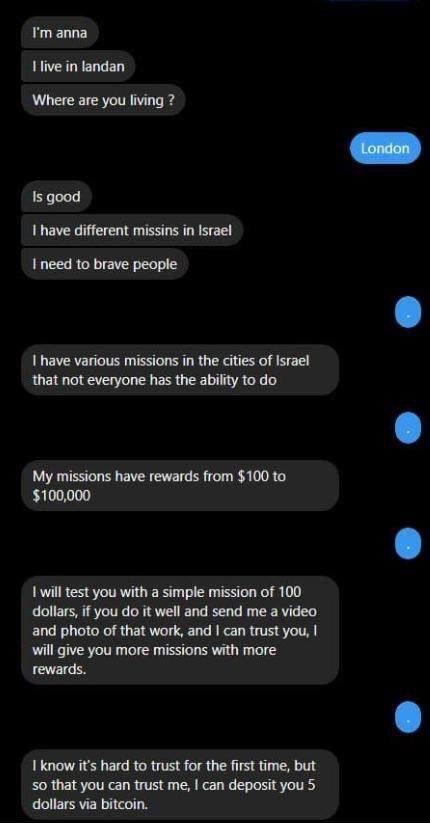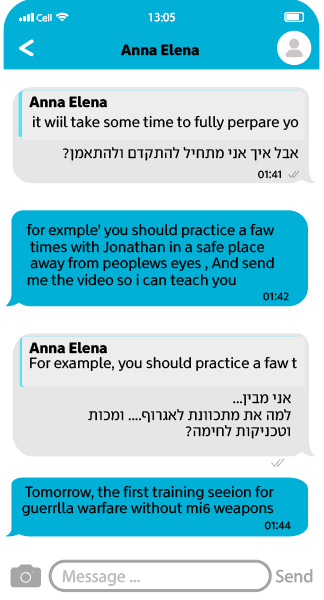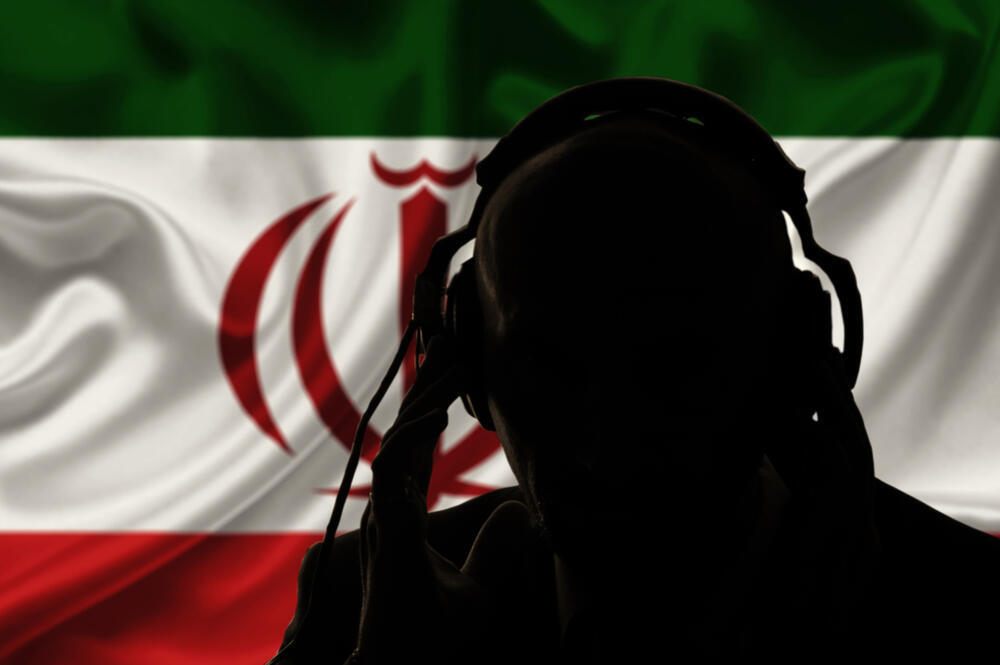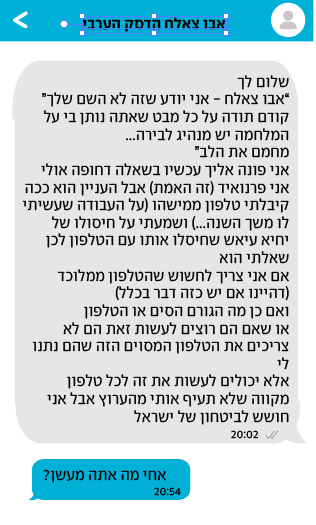She introduced herself as "Anna Elena," who lived in Canada, claiming to be an activist campaigning against traffic accidents in England. She asked for his help in "saving lives in Israel." But according to the Shin Bet, this persona was an Iranian operative. The tasks assigned to him, which began with hanging posters, soon evolved into a series of subversive missions, ranging from activating a buried phone to offering payment for setting a forest fire and carrying out an assassination.
Until he received the message on Telegram from Anna Elena, 22-year-old Elimelech Stern, a member of the Vizhnitz Hasidic sect, appeared to live a routine life. He was a yeshiva student training to become a Sofer Stam (scribe of religious texts) but was also burdened by approximately 70,000 shekels (roughly $19,000) in debt, which he attributed to "poor financial management."
His Shin Bet interrogations paint a portrait of someone who may not have fully understood the true identity of his handler, yet he clearly recognized he had long since crossed the line. He admitted that feelings of doubt, anxiety and guilt arose throughout his involvement.
In a late-night interrogation on June 27, 2024, Stern confessed to a Shin Bet officer, known by the alias "Uzi," that he had been in contact with a profile on Telegram named "Anna Elena." He detailed the tasks he had been assigned and his actions in response.
Initially, he communicated using his regular phone but was later instructed to acquire a separate device for their correspondence. Stern enlisted the help of an individual, identified as Jonathan, to retrieve the new phone from the Haifa area. Despite this, he continued to use his original device as he struggled to operate the new one.
In fact, on the very night he was apprehended by Shin Bet officers on June 27, 2024, Stern opened up almost immediately, as if he had been waiting a long time just to unburden himself. He was questioned at his home in Beit Shemesh between 2:50 a.m. and 4:05 a.m.
During that interrogation, the Shin Bet officer told Stern he believed he knew why the security forces had arrived. Stern nodded and replied, "I think I know what this is about, it’s connected to the phone I handed over to the police a few minutes ago (at the time of the arrest) and to things I’ve done recently. It all started with a Telegram profile about a month ago (in reality, even earlier)."
In that brief interrogation, Stern confessed to "Uzi" the key contents of his conversations with Anna Elena and the tasks she had assigned him. The investigator recounted that when he asked Stern about his connection to the Telegram profile, the Hasid began describing the missions he had been assigned, some of which he had carried out, others he refused.
Stern explained that at first, he had communicated with Anna Elena using Telegram on his regular phone. But after receiving the initial assignments, the Iranian operative instructed him to collect a separate device to continue their communications.
Stern contacted Jonathan, who lived in the Jerusalem area, asking him to retrieve the operational phone from the Haifa area and deliver it to him. Even after receiving the new device, Stern continued using his old one due to difficulties operating the new phone.
This was not the only time Stern would enlist and pay other Israelis to carry out tasks on behalf of Iran, mainly Jonathan, but also an individual named Nathaniel. At Anna Elena’s request, Stern sent Jonathan to stash $450 in two locations in the Tel Aviv area, while he instructed Nathaniel to hide money in 25 different spots across Tel Aviv and Jerusalem.
The Shin Bet investigator reported what Stern had told him on that late-night investigation: "He received a photo of bloodied hands, which he printed multiple times and directed Jonathan to hang them across Tel Aviv. He was compensated with several hundred shekels for this task.
"Further assignments included setting a forest fire, placing a severed sheep's head outside the residence of Israel's ambassador to the International Atomic Energy Agency and arranging for a doll with a knife inside a box, all in exchange for money. The Anna Elena profile also requested tasks that Stern refused to carry out, such as setting a forest on fire or shooting at a person."
"Uzi" also wrote that Stern expressed uncertainty about the true identity of the Telegram profile, but "he speculated that she might reside in the Haifa area or abroad.
When asked what he thought were the motives behind the tasks that the woman behind the profile asked, Stern said it was never stated explicitly. However, on one occasion, when he asked whether he was expected to target cars belonging to right-wing or left-wing Israelis, the profile responded, “It doesn’t matter, the main goal is to sow chaos in the country.”
When he refused to set a forest fire, Stern was questioned by the profile about his willingness to shoot someone. "Given these examples, Stern deduced that the missions were intended to harm the State of Israel and possibly had antisemitic grounds," wrote the officer. At this point, the officer asked Stern to bring his tefillin and follow him to the Petah Tikva police station, but the Hasid replied that his tefillin were at the synagogue. "Stern thanked me that despite all the commotion, his daughter remained asleep," said the officer. "Stern blessed his wife and left his home." On the way to the police station, the officer told Stern they would stop first at the synagogue to get the tefillin. "Stern shook my hand, thanking me for my understanding."
And so, just before dawn, the Shin Bet investigators drove with Stern to the Vizhnitz synagogue in Beit Shemesh to retrieve the tefillin and then proceeded to the police station in Petah Tikva.
Interrogations at the Shin Bet facility
At dawn, Stern underwent another interrogation, beginning shortly after 7 a.m. His interrogation was deliberately conducted at the Petah Tikva police station, where he had been taken after his arrest in Beit Shemesh. The station is no ordinary facility; it houses a special Shin Bet interrogation center known for holding Jewish settlers suspected of attacking Palestinians. Protesters have frequently gathered outside the facility to demonstrate against the interrogations conducted within its walls.
In 2010, the Israeli human rights group B’Tselem published a report claiming that detainees in the facility were subjected to “inhumane confinement conditions, including sealed solitary cells, isolation, poor hygiene, prolonged restraints during interrogations restricting body movement, sleep deprivation and other measures."
According to the Shin Bet, Stern’s interrogation unfolded differently. Although he was initially denied access to legal counsel due to potential harm to national security, the investigation was marked by relative cooperation. While his interrogators at times accused him of lying or deliberately withholding information, Stern generally cooperated with investigators and answered questions, albeit with occasional delays in recalling information.
He claimed he was unaware he was working for Iran. The Shin Bet, however, maintains that he was fully aware that he was acting on behalf of a hostile entity.
During his first interrogation on the morning of June 27, a Shin Bet investigator known as "Fuad" made Stern a cup of coffee and asked him about his life. Stern recounted that about nine months before his arrest, he had uncharacteristically purchased a smartphone, which is an unusual step in his ultra-Orthodox community, learned how to operate it and downloaded apps in order to trade cryptocurrency. He joined various Telegram groups to learn about investing and once fell victim to a scam that cost him 5,000 shekels (about $1,350).
Then, in March, he received a brief three-line message from someone identifying herself as "Anna." It was followed by a proposal to carry out tasks in Israel for $100 and up to $100,000. "I didn’t know English, so I had to translate it to understand," Stern told the investigator. "I asked her what she wanted, and Anna Elena replied by asking if I wanted to make money. She said if I did what she told me, I’d be rich, I’d have a new car and more,” Stern said.
Get the Ynetnews app on your smartphone: Google Play: https://bit.ly/4eJ37pE | Apple App Store: https://bit.ly/3ZL7iNv
Stern, still shaken by his previous experience with a scam, asked Anna Elena why she had contacted him specifically. She claimed to be leading a safe driving campaign that had begun in England, where many children were allegedly killed in traffic accidents. "She said she wanted to start a similar campaign in Israel and would like me to hang posters," explained Stern. "She offered $20 for each poster I would hang."
He searched Google to check if it was illegal to hang posters in public places and told the investigator he found no such prohibition.
Anna Elena soon sent him a photo of a bloodied hand with English text: "It will be written in history that children were killed. Let’s stand on the right side of history." Though Stern was disturbed by the photo, he said he couldn’t translate the message that was written on it. Anna Elena reassured him that it was "for the sake of protecting children."
Stern emailed the image to himself and went to a shop in Beit Shemesh that provides computer services to the Haredi public. He printed 150 copies for 150 shekels. "I arrived home with the posters, hiding them under some floor tiles near my apartment." He sent a photo of the stack to Anna Elena and received $50 in cryptocurrency in return.
As in other known cases, the Iranians followed a familiar method with Stern: starting with small, seemingly innocuous tasks that gradually escalated. This method builds trust with recruits, blurs their moral boundaries and creates both dependency and a sense of obligation. So, when Anna Elena contacted Stern again, her request had evolved; this time, she offered $2,600 to hang posters in Tel Aviv.
"I didn’t want to do it myself," Stern told the investigator. "I don’t know Tel Aviv, I don’t have a car, I didn’t want my wife to find out, and as a Haredi man, I’d attract attention hanging posters."
Still eager to receive the payment, Stern posted in a Telegram job group that he was looking for someone to complete a "task." Within minutes, a man named Jonathan from Beitar Illit responded. "I told him I was looking for someone to hang posters in Tel Aviv and that I was willing to pay for it," Stern explained. Jonathan agreed.
That evening, Stern withdrew 1,800 shekels from an ATM for the sake of executing the task. He left the posters, glue, and payment for Jonathan in an attic above his building, and also explained how to access it: You should use the elevator to reach the sixth floor, and climb another floor on foot. Jonathan later messaged Stern: "Rabbi, I got the items and the money. I’m on my way."
Though Stern’s actions seemed suspicious, Jonathan did not question the secrecy in performing the job or collecting the posters.
"Stern suspected that the message came from a hostile entity, possibly in Israel or abroad, but did not contact the police, even when he feared the phone Anna Elena had sent him might be booby-trapped. When wildfires were reported in areas Anna Elena had mentioned, Stern worried there might be a connection. Stern was, in practice, deeply involved and knowingly chose to continue the relationship in a way he believed was safe."
Stern informed Anna Elena that he was to perform the task within an hour, but concealed the fact that he wasn’t doing it himself. Anna Elena sent him a map with several locations around Tel Aviv marked on it, instructing him to hang a poster every 100 meters. She demanded a photo of each poster that was hung.
Stern relayed these instructions to Jonathan, who worked from 2 a.m. to 6 a.m., mainly along the bustling Ibn Gabirol Street. But the operation didn’t go smoothly. Someone tore Jonathan’s bag of posters, and municipal inspectors questioned him.
As he was left with 20 posters, he estimated that he had hung 130 posters and updated Stern. Anna Elena, however, was furious, accused Stern of hanging only 60 posters, and “fined” him for failing to complete the task. Stern insisted he had hung up 130.
He told the investigator that, to the best of his knowledge, Anna Elena eventually paid him $1,500 in crypto and that he promised her to keep the remaining 20 posters.
'Bro, what are you smoking?'
Two days later, Anna Elena resurfaced with a new request for Stern, asking to replace his cellphone to "protect his family." He found this suspicious but thought perhaps it was for his safety, or possibly to allow her to track his location.
Anna Elena sent him GPS coordinates for a location in Haifa where the new phone was buried. Stern didn’t want to retrieve it himself, saying, "It didn’t make sense for a Haredi man to dig up a phone." Once again, he enlisted Jonathan, who traveled to Haifa and retrieved the buried device according to the coordinates provided.
Soon after Jonathan retrieved the phone, Anna Elena confronted Stern: "Is it true you didn’t pick up the phone yourself?" Stern evaded the question, saying he was afraid, so he had come with a friend and waited in the car.
Anna Elena asked for Jonathan’s profile, but Stern refused, fearing she would contact Jonathan directly and thus he would lose money. By that point, it seemed that Stern no longer believed the project had anything to do with traffic safety.
After Jonathan gave Stern the phone, Stern suspected it was booby-trapped and might be detonated in a crowded area. He chose not to turn it on until he clarified the matter.
Stern reached out to another Telegram user and asked whether it was possible to kill people using a booby-trapped phone. The reply was affirmative, referring to the Israeli assassination of Hamas terrorist Yahya Ayyash.
The Shin Bet investigator noted on the interrogation documents that Stern became increasingly uneasy about the phone. Therefore, he joined a popular Telegram channel that includes more than 100,000 followers and focuses on security topics, operated by a user called "Abu Salah," who invites questions from followers.
Stern texted Abu Salah that he felt “paranoid,” but he had received a suspicious "cellphone from someone," and then heard about the assassination of Yahya Ayyash.
He asked whether he should be worried about the phone being booby-trapped, "Is it possible? And if it is, what could be the cause? The phone itself, or the SIM card, or could they attack me from any other phone, and not just from the phone they gave me? I hope you won’t kick me out of the channel, but I’m concerned for Israel’s security."
Abu Salah responded directly: "Bro, what are you smoking?" Stern replied, "Believe me, I don’t smoke. I’m just a regular Haredi guy. I just want to know if I have reason to worry; if they want to detonate it, do they need this phone or can they target any other phone, maybe they need to know my location." Abu Salah responded while wondering "why would they want to assassinate you?" and Stern replied, "it's not personally me. The phone might be detonated once I am identified in a crowded place."
Stern asked Abu Salah for contact information of a police officer to consult, but received no reply.
Despite his fears, Stern did not contact the police. He was reluctant to get himself into trouble and still wanted to maintain his connection with Anna Elena, who was supplying him with money.
Ultimately, he took the risk and turned the phone on. Anna Elena instructed him to turn it on at a distance of three kilometers (two miles) from his home, asking him to install multiple SIM numbers. When he struggled with that, she told him to download Instagram. Stern created an account under the name “Haim” and hid the phone above the wooden beams used for his sukkah in the stairwell.
Some days passed, and then came Anna Elena’s most unusual request—to set a forest on fire. She sent Stern a map of a forest near Jerusalem and asked him to light it on fire, offering $3,000 in return. Stern refused, saying he was afraid, and asked why he should burn a forest for no reason. Anna Elena responded by more than doubling the offer to $7,000, but he still declined.
She then pressed, asking him to set a car on fire or smash a shop window near an area where protests take place. Again, Stern refused. Stern told the investigator he tried to "buy time" with Anna Elena to avoid severing the relationship completely, and insisted he was willing to perform tasks related only to hanging posters.
Still, he admitted that by then, it was clear the missions weren’t as innocent as they seemed, but "I thought maybe they were anarchists with money trying to overthrow the government," he told his interrogators. The Shin Bet investigator, however, concluded Stern understood he was working for a hostile entity with malicious intent toward the State of Israel.
In June 2024, as the investigation progressed, the Shin Bet and the police's Lahav 433 National Crime Unit arrested three Israeli citizens suspected of operating under Iranian intelligence directives.
When pressed by Shin Bet investigators, Stern admitted that after that conversation, he turned to Jonathan and told him that Anna Elena had asked him to light wildfires and set cars on fire.
Jonathan, whose livelihood was also tied to the operation, reportedly told Stern to keep going. According to Stern, had Jonathan not encouraged him, he believed he would have stopped.
In one message retrieved by the Shin Bet, Stern texted Jonathan that everything he had done was "legal, or close enough to being legal, maybe mysterious, but legal." Jonathan replied, "You have to understand, once you start something like this, there’s no turning back."
In a later interrogation, Stern recalled Anna Elena asking him directly: "What will you do if I ask you to shoot someone?" saying that she would offer $75,000 for it along with a promise to fly him out of the country. Stern declined, saying, "It didn't suit him."
The real motive
At a certain stage, Stern had begun to doubt Anna Elena’s cover story about living in Canada. He once asked her what time it was in her location; she did not fall for it and replied with an answer that matched Toronto time.
Shin Bet investigator: "Would you dishonor your Hasidic community for money?" Stern: "No" Investigator: "Do you care if your actions harm the State of Israel?" Stern: “In this case, I feel neutral and less committed."
Shortly before his arrest, in June 2024, Anna Elena messaged Stern on Telegram, saying that he and Jonathan should find a secluded forest location, and she would provide training "similar to what the British Secret Intelligence Service MI6 gives to its soldiers." The first training, she said, would focus on guerrilla warfare without weapons, which she had already given to four other individuals in the past.
When Stern asked whether it involved physical combat, Anna Elena said that it would come in later phases. He said he would speak with Jonathan, but no such conversation ever took place.
Despite his limited understanding of smartphones and the internet, Stern, the Vizhnitz Hasid, managed to navigate the technology, as testified by the investigator: "When I asked him if the phone he had received from Anna Elena was preloaded with apps, or he had to download them, Stern said most were already installed. He had personally added Telegram, Instagram, a VPN and another messaging app with a green icon that failed to download. Later, for his personal use, he downloaded other Telegram apps, such as Telegram Plus, Telegram Premium and another app with a black X icon."
Summarizing the case, the Shin Bet investigator wrote: "Stern suspected that the message came from a hostile entity, possibly in Israel or abroad, but did not contact the police, even when he feared the phone Anna Elena had sent him might be booby-trapped."
"After receiving reassurance from an anonymous Telegram user that the device posed no threat, he chose to continue the relationship. When wildfires were reported in areas Anna Elena had mentioned, Stern worried there might be a connection. Stern was, in practice, deeply involved and knowingly chose to continue the relationship in a way he believed was safe."
When asked why he went through with all of it, Stern told his interrogator: "For the money."
Investigator: "Would you dishonor your Hasidic community for money?"
Stern: "No."
Investigator: "Do you care if your actions harm the State of Israel?"
Stern: "In this case, I feel neutral and less committed."
In another session, Stern simply said: "A servant of God is always free."



